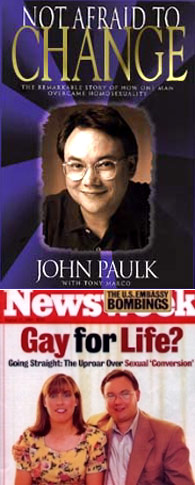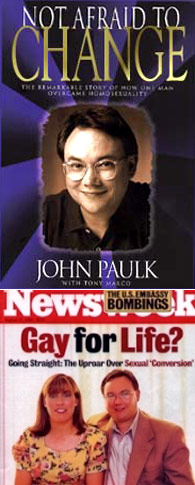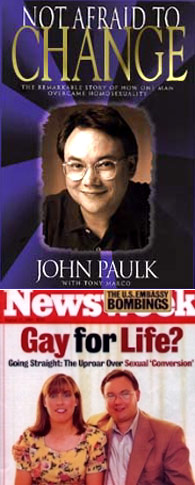Which gay man or woman has never contemplated the thought of turning straight?

John Paulk's media credentials include a Newsweek cover feature (with his ex-lesbian wife Anne), 60 Minutes, the series of religious right-sponsored ads that appeared in newspapers across the US and his 1998 autobiography, Not Afraid to Change: The Remarkable Story of How One Man Overcame Homosexuality.
To better understand this 'conversion' from homosexual to heterosexual, it is imperative we delve into the 'nature versus nurture' debate. Sexual orientation, to this day, has baffled scientists. And while it used to be just a nature versus nurture argument, these days the focus is on how they both interact to determine one's sexual orientation.
While many believe early childhood and environment do play a part, tremendous research and evidence done from 1950s onwards also support the biological argument with the pre-natal stage of human development being regarded as the crucial "determining" stage.
Most mental health professionals however believe that sexual orientation is not a choice. The American Psychiatric Association's website supports this, saying "Sexual orientation emerges for most people in early adolescence without any prior sexual experience. And some people report trying very hard over many years to change their sexual orientation from homosexual to heterosexual with no success. For these reasons, psychologists do not consider sexual orientation for most people to be a conscious choice that can be voluntarily changed."
That seems to be the general stand in the psychiatric community. In the real world, however, things are not so clear cut. A large majority of the Asian community, for example, still believe that homosexuality is changeable, revertible, and curable.
In fact, a friend who recently came out to his family, had his parents suggesting that "maybe if he had more discipline, it will go away". That seems to be the general view of many Asians in our present society.
This originates from a deeply rooted stigma attached to homosexuality which runs deeper than that placed by those in the Western world. While Rome had its celebration of Eros and male love, the closest Chinese culture got to leanings of homosexuality were eunuchs in the courts. Till this very day, homosexuality in the Asian context is simply not talked about, let alone celebrated.
The role of every man and woman in an Asian community is moreover clearly defined. Marriage is not an issue taken lightly, and any individual who does not marry carries the kilo-tonne burden of a stigma placed upon by one's elders, constantly being reminded with silent accusations of "being irresponsible" and "simply hasn't grown up yet". This only ends when one's childbearing age reaches "menopausal" range, or in the case of guys, never.
Being an "alternative" person in a much still conservative society, many Asian gays and lesbians may feel a stronger need to conform to society than our Western counterparts. No man is an island, the old saying goes. This need to be part of the larger community is a Confucian age-old principle, and is perfectly natural for an Asian.
The "ability to conform" is one of the most famous attribute of the Asian people. The failure to do so calls upon the wrath of social judgement, much social frowning, and for some, social "coventry".
This social prejudice and judgement may at times be strong enough for one to strongly desire to be straight so as to escape it. Social prejudice against gays in Singapore by the authorities and by society is particularly harsh.
Studies done by our local universities show that many people still would not feel comfortable sitting next to homosexuals on the bus, nor would like to even be seen in public with them.

John Paulk's media credentials include a Newsweek cover feature (with his ex-lesbian wife Anne), 60 Minutes, the series of religious right-sponsored ads that appeared in newspapers across the US and his 1998 autobiography, Not Afraid to Change: The Remarkable Story of How One Man Overcame Homosexuality.
Most psychologists and therapists promoting "conversion" or "reparative" therapy are essentially motivated by strong religiously conservative beliefs. Many believe that homosexuality is sinful, that people choose their sexual orientation, and that 'we' can change it with some counselling and prayer.
Many groups in the US preach this. Groups such as the National Association for Research and Therapy of Homosexuality, (NARTH), a non-profit, educational organisation, have dedicated themselves to the research, therapy and prevention of homosexuality, and carry out reparative therapy for homosexuals wanting to change.
Spokesperson C.W. Socarides stated: "Homosexuality is a psychological and psychiatric disorder, there is no question about it...It is a purple menace that is threatening the proper design of gender distinctions in society."
In Singapore itself, who can forget the awful after-taste left behind in one's mouth after a local church proudly displayed a poster declaring that "homosexuals can change". That raised a hoo-hah in the community worthy of Mardi Gras proportions by Singapore's standards.
The "cure" to homosexuality, they believe, is for the adult to enter into a close, intimate, but non-sexual relationship with a same-sex adult, perhaps a therapist or counsellor coupled with prayer. The client can then go on to overcome the deficiencies in their childhood. Becoming attracted to members of the opposite sex naturally follows.
However, success is far from certain.
In fact, the most famous failures in "conversion therapy" history could be found in Exodus International which upholds redemption for the homosexual person by preaching heterosexuality as God's creative intent for humanity.
Despite their motto that once "sin's (i.e. homosexuality's) power is broken", the individual is "freed to know and experience" his true heterosexual identity, the founders of Exodus themselves, Michael Bussee and Gary Cooper fell in love with each other and left the group, and their wives, in the late 1970s.
There are, to date, no scientific studies determining either the actual efficacy or harm of such "reparative" treatments. There is little scientific data about selection criteria, risks versus benefits of the treatment, and long-term outcomes of "reparative" therapies.
What is available are anecdotal reports of individuals who have claimed to change, people who claim that attempts to change were harmful to them, and others who claimed to have changed and then later recanted those claims.

John Paulk's media credentials include a Newsweek cover feature (with his ex-lesbian wife Anne), 60 Minutes, the series of religious right-sponsored ads that appeared in newspapers across the US and his 1998 autobiography, Not Afraid to Change: The Remarkable Story of How One Man Overcame Homosexuality.
Self-loathing and internalised hetero-sexism or homophobia may be the causative agents which may lead one to believe that he or she would prefer not to be gay. These people may believe that attempting to become heterosexual is the best treatment, rather than addressing the deeper issues of accepting his or her inherent sexuality.
People who seek such therapies "obviously have some strong shame or guilt or self-hatred," and usually do so as a desperate attempt to maintain connections with families, friends, and religious communities that have rejected them for who they are. It is largely this rejection and the effects of conversion therapy itself that cause gay, lesbian and bisexual people to become depressed, not their sexual orientation.
Their feelings of failure not only intensify when they can't change, but add additional guilt to their lives. And those who try marriage despite less-than-complete conversions hurt others as well, for to quote an APA official: "You're generating a lot of unhappy marriages, a lot of painful divorces."
Often, this internalised guilt may rack these people to the point of depression, anxiety and self-destructive behaviour, since they themselves or the therapists aiding them may align them with societal prejudices against homosexuality. This merely reinforces the self-hatred already experienced by them. Besides, many such people who eventually "undergo reparative therapy" are instructed that homosexuals are lonely, unhappy individuals who never achieve acceptance or satisfaction in life.
As some "patients" attest, "The possibility that a homosexual might achieve happiness and satisfying interpersonal relationships, or the alternative approaches to dealing with the effects of societal stigmatisation were never discussed."
Yes, we all know the world isn't a gay-friendly place, and rejection by society and even one's own family can be overwhelming. But we don't need people to try to change us. We need them to be helping us work on a different world for us to live in, or more realistically, creating space in the existing world where we could all live in.
Many interventions aimed at changing sexual orientation have succeeded only in reducing or eliminating homosexual behaviour rather than in creating or increasing heterosexual attractions. They have, in effect, deprived individuals of their capacity for sexual response to others.
Hence, the only therapy we require, I believe, is to help restore the damage that homophobia and social stigmatisation has done to our own self-esteems. We have to learn to accept who we are, and only then, can we learn and appreciate to live life fully. Or as Thomas Merton would say: "The only true pleasure in life is to escape from the prison of one's own making."











 列印版本
列印版本










讀者回應
搶先發表第一個回應吧!
請先登入再使用此功能。